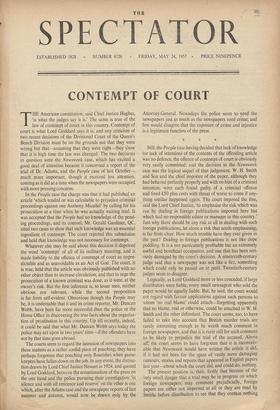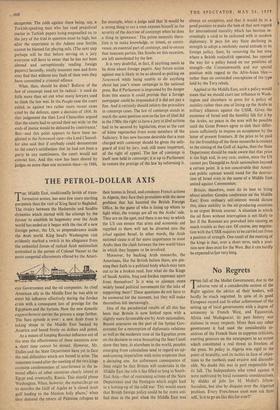CONTEMPT OF COURT
THE American constitution, said Chief Justice Hughes, ,i, what the judges say it is.' The same is true of the law of contempt of court in this country. Contempt of court is what Lord Goddard says it is, and any criticism of two recent decisions of the Divisional Court of the Queen's Bench Division must be on the grounds not that they were wrong but that—assuming that they were right—they show that it is high time the law was changed. The two decisions in question were the Newsweek case, which has excited a good deal of attention because it concerned a report of the trial of Dr. Adams, and the People case of last October— much more important, though it received less attention, coming as it did at a time when the newspapers were occupied with more pressing concerns.
In the PEople case the charge was that it had published an article 'which tended or was calculable to prejudice criminal proceedings against one Anthony Micallef' by calling for his prosecution at a time when he was actually waiting trial. It was accepted that the People had no knowledge of the pend- ing proceedings, and its counsel, Mr. Gerald Gardiner, QC, cited two cases to show that such knowledge was an essential ingredient of contempt. The court rejected this submission and held that knowledge was not necessary for contempt.
Whatever else may be said about this decision it deprived the word 'contempt' of all of its ordinary meaning, and it made liability to the offence of contempt of court as unpre- dictable and as unavoidable as an Act of God. The court, it is true, held that the article was obviously published with no other object than to increase circulation, and that to urge the prosecution of a known criminal was done, as it were, at the owner's risk. But the first inference is, to lesser men, neither obvious nor relevant, while the second proposition is far from self-evident. Obnoxious though the People may be, it is undeniable that it and its crime reporter, Mr. Duncan Webb, have been far more successful than the police or the Home Office in discovering the true facts about the organisa- tion of prostitution in this country. Up till recently, indeed, it could be said that what Mr. Duncan Webb says today the police may act upon in two years' time—if the offenders have not by that time gone abroad.
The courts seem to regard the intrusion of newspapers into these matters as a rather sordid piece of poaching; they have perhaps forgotten that poaching only flourishes when game- keepers have fallen down on the job. In any event, the distinc- tion drawn by Lord Chief Justice Hewart in 1924, and quoted by Lord Goddard, between the sensationalism of the press on the one hand and the police pursuing their investigation 'in silence and with all reticence and reserve' on the other is one which, after the Adams case and the newspaper reports of last summer and autumn, would now be drawn only by. the Attorney-General. Nowadays the police seem to need the newspapers just as much as the newspapers need crime; and few would disagree that the exposure of crime and injustice is a legitimate function of the press.
Still, the People case having decided that lack of knowledge (or lack of intention) of the contents of the offending article was no defence, the offence of contempt of court is obviously very easily committed; and the decision in the Newsweek case was the logical sequel of that judgement. W. H. Smith and Son and the chief importer of the paper, although they had behaved perfectly properly and with no hint of a criminal intention, were each found guilty of a criminal offence and fined £50 plus costs with threat of worse to come if any- thing similar happened again. The court imposed the fine, said the Lord Chief Justice, 'to emphasise the risk which was run by dealing in foreign publications imported here but which had no responsible editor or manager in this country.' Just why there should be any risk at all in dealing with such foreign publications, let alone a risk that needs emphasising, is far from clear. How much trouble have they ever given in the past? Dealing in foreign publications is not like dope peddling. It is a not particularly profitable but an extremely useful and beneficial occupation, and one that has been seri- ously damaged by the court's decision. A nineteenth-century judge said that a newspaper was not like a fire, something which could only be passed on at peril. Twentieth-century judges seem to disagree.
Logically, as Lord Goddard more or less conceded, if large distributors were liable, every small newsagent who sold the paper would be equally liable. But, he said, the court would not regard with favour applications against such persons to whom 'no real blame' could attach—forgetting apparently that no blame, real or otherwise, could be attached to W. H. Smith and the other defendant. The court seems, too, to have failed to take into account that British murder trials arc rarely interesting enough to be worth much comment in foreign newspapers, and that it is rarer still for such comment to be likely to prejudice the trial of the accused. Above all the court seems to have forgotten that it is inconceiv- able that Newsweek would have written the article it did, if it had not been for the spate of vastly more damaging rumours, stories and reports that appeared in English papers last year—about which the court did, and could do, nothing. The present position is, then, firstly that because of the ery small danger that a trial may be in progress on which foreign nevvspapers may comment prejudicially, foreign papers are either not imported at all or they are read by Smiths before distribution to see that they contain nothing
dangerous. The odds against there being, say, a Turkish-speaking man who has read prejudicial matter in Turkish papers being empanelled on to the jury of the trial in question must be high, but after the experience in the Adams case Smiths cannot be blamed for playing safe. (The next step perhaps will be that before serving on a jury everyone will have to swear that he has not been abroad and surreptitiously reading foreign papers.) Secondly, totally innocent men and firms may find that without any fault of their own they have committed a criminal offence.
What, then, should be done? Reform of the law of contempt need not be radical : it need do little more than set out what many lawyers used to think the law was. In the People case the court relied, as against two rather more recent cases cited by the defence, upon a decision of 1806. In that judgement the then Lord Chancellor argued that the courts had to spread their net wide 'or the ends of justice would be defeated by contrivance.' But—and this point appears to have been ne- glected in the Newsweek case—the Lord Chancel- lor also said that if anybody could demonstrate to the court's satisfaction that he had not been a party to any contrivance, the court would not convict him. And this view has been shared by judges on more than one occasion since—in 1886, for example, when a judge said that 'it would be a strong thing to say a man exposes himself to the severity of the doctrine of contempt when he does a thing in ignorance.' The prime necessity there- fore is to make knowledge, or intent, or contri- vance, an essential part of contempt, and to ensure that innocent parties, like Smiths on this occasion, are left unmolested by the law.
It is very doubtful, in fact, if anything needs to be done about foreign papers. Any future action against one is likely to be as absurd as picking on Newsweek while being unable to do anything about last year's smear campaign in the national press. But if Parliament is impressed by the danger from this source it could provide that a foreign newspaper could be impounded if it did not pay a fine. And it certainly should reform the procedure in contempt cases. The law of contempt stands in much the same position now as the law of libel did in the 1780s; the right to have a jury in libel actions had to be secured by legislation, even at the cost of bitter reproaches from some members of the Judiciary. It has now become desirable that a man charged with contempt should be given the safe- guard of trial by jury, and, still more important, of the right of appeal. The law of contempt is itself now held in contempt; it is up to Parliament to restore the prestige of the law by reforming it.































 Previous page
Previous page